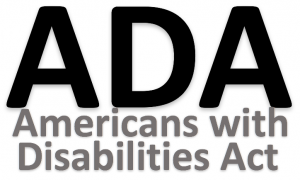The employment attorneys at Nardone Limited regularly assist our clients with labor and employment issues, such as Department of Labor (“DOL”) compliance, as well as guidance on preventing and responding to discrimination and harassment charges filed with the Equal Employment Opportunity Commission (“EEOC”) and the Ohio Civil Rights Commission (“OCRC”). Our employment attorneys also regularly update clients on news, events, and changes in law as it relates to labor and employment issues that may impact our clients.
Background on the Americans with Disabilities Act
It is common knowledge that the Americans with Disabilities Act (the “ADA”), prohibits an employer from discriminating against an employee, or a potential employee, based on a disability. The ADA requires covered employers to provide reasonable accommodations to applicants and employees with disabilities. Generally, a reasonable accommodation is “any change in the work environment or in the way things are customarily done that enables an individual with a disability to enjoy equal employment opportunities.” 29 C.F.R. pt. 1630 app. §1630.2(o).
Providing a Leave of Absence as a Reasonable Accommodation under the ADA
A reasonable accommodation for an employee with a disability may include the employer providing the employee with an extended leave of absence. This means that an employer may have to grant an extended leave of absence as a reasonable accommodation to employees who require it because of a disability, and this may include the employer allowing for an additional leave of absence beyond the employer’s maximum leave policy. According to the EEOC, providing a leave of absence is considered “extended leave” under the ADA. Click here for the EEOC publication, Employer-Provided Leave and the Americans with Disabilities Act.
But, there are many questions as to what extended leave means under the ADA. The vagueness regarding the extended leave accommodation results in most employers not knowing how to comply with the ADA’s requirement, and what amount of extended leave is necessary to provide a reasonable accommodation for an employee with a disability. Not only are employers confused with the ADA’s requirements, courts are also unable to provide guidance, with many courts issuing conflicting rulings on the ADA’s requirement for extended leave as a reasonable accommodation.
A Recent Ruling from the Seventh Circuit Held that Extended Leave is Not a Reasonable Accommodation under the ADA
The most recent ruling on extended leave being a reasonable accommodation, which ruled in favor of the employer, is from the Seventh Circuit Court of Appeals in the case of Severson v. Heartland Woodcraft, Inc. This case dealt with an employee who took a 12-week leave under the Family Medical Leave Act (“FMLA”) for a long-standing back problem. 872 F.3d 476 (7th Cir. 2017). At the end of the 12-week leave, the employee had surgery on his back, which required him to be off work for another two-three months. The company declined the employee’s request for additional leave and subsequently terminated the employee. The Seventh Circuit ruled in favor of the employer stating, “the ADA is an anti-discrimination statute, not a medical-leave entitlement” and held that a long-term absence is not a reasonable accommodation under the ADA. The court further held that the ADA only prohibits discrimination against “a qualified individual on the basis of disability” and therefore “inability to work for a multi-month period removes a person from the class protected by the ADA.” The court explained that the obligation to provide a reasonable accommodation applies only to workplace adjustments that will allow the employee to actually perform the work. Thus, someone who is seeking time off from work cannot actually perform the work and is therefore not a “qualified individual” under the ADA.
The ruling from the Seventh Circuit determined that an extended leave of absence based on a disability is not a reasonable accommodation. The Seventh Circuit’s ruling is a great result for employers, and reiterates that the ADA is an anti-discrimination statute, which should only apply workplace adjustments to those employees who are able to perform the work. But, it should be noted that not every Circuit Court has made this determination. More court decisions are necessary to appropriately define the ADA’s reasonable accommodation requirement regarding an extended leave of absence for an employee with a disability.
Contact Nardone Limited
If your business has questions about what employee policies and provisions your employee handbook or manual should include, contact the attorneys at Nardone Limited. The employment attorneys at Nardone Limited are well versed in employee policies and handbooks. The employment attorneys at Nardone Limited can also handle a full spectrum of employment law issues, including business disputes and litigation, drafting employment and restrictive covenants, and consultation on employment law issues. If you need advice or representation in an employment dispute before the EEOC, the OCRC, or regarding potential labor and employment litigation, feel free to contact Nardone Limited.
